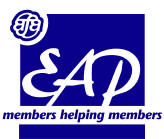Managing your Anxiety Around Coronavirus

Managing your Anxiety Around Coronavirus
From your AFA EAP
Coronavirus (COVID-19) is a new risk, not a familiar one. Its status as a new health problem with which we are unfamiliar contributes to our heightened anxiety. Remember, anxiety is a protective measure. It’s signaling you to scan for risks and find methods to safeguard yourself. Embrace your anxiety for what it is…. a “pay-attention” signal. However, ensuring that your anxiety doesn’t exceed your ability to continue functioning is important. Below are some suggestions that may help you modulate worry so it remains in the healthy response range for you and your family.
1) Get the facts- Find credible sources of information about protective measures from sources you can trust. This might include the U.S. Centers for Disease Control and Prevention, the World Health Organization, your local or state public health agencies, your family physician and AFA.
2) Assess Your Vulnerability to Continuous News- Although you will want to keep informed, limit worry and agitation by lessening the time you spend watching or listening to upsetting media coverage. Remember to take a break from watching the news and focus on the things that are positive in your life and things you have control over.
3) Take Action – Engage in protective measures recommended by reliable sources so you can continue to function. Taking effective action steps not only protects you physically but emotionally. Action provides us with a sense of control. It reduces or “grounds” our anxiety. You may have discovered some action steps that were particularly effective for you when past national health alerts occurred. Borrow what worked for you then and use those techniques now.
4) Keep connected. Maintaining social networks can foster a sense of normalcy and provide valuable outlets for sharing feelings and relieving stress. Remain flexible in your methods of connecting with others especially if vulnerable friends and family have chosen to engage in social distancing.
5) Communicate with your children. Discuss the news coverage of the coronavirus with age-appropriate information. Parents can help allay distress by focusing children on routines and schedules. Remember that children will observe your behaviors and emotions for cues on how to manage their own feelings during this time.
6) Seek Additional Help– If your worry begins to amplify beyond the protective range and into the overwhelming range seek assistance. Your AFA EAP can help you identify local professional help. If you are already under professional care for an anxiety disorder stay in close communication with your treating provider. Virtual therapy sessions may even be available to you. AFA EAP can be contacted at 800-424-2406.

